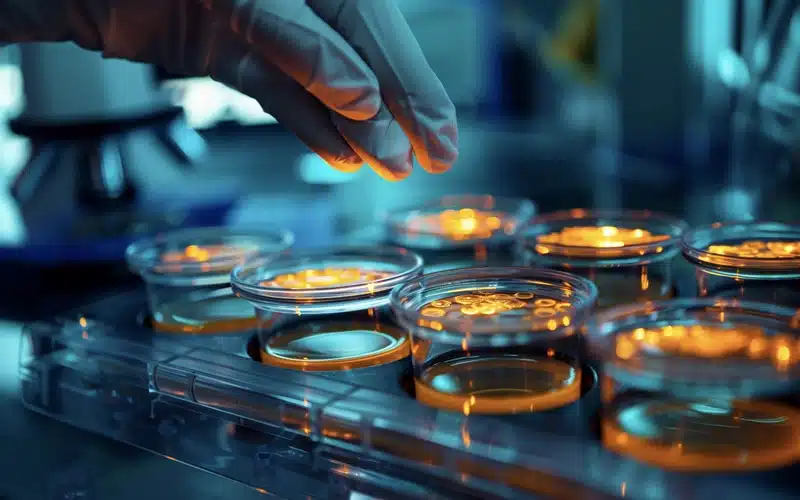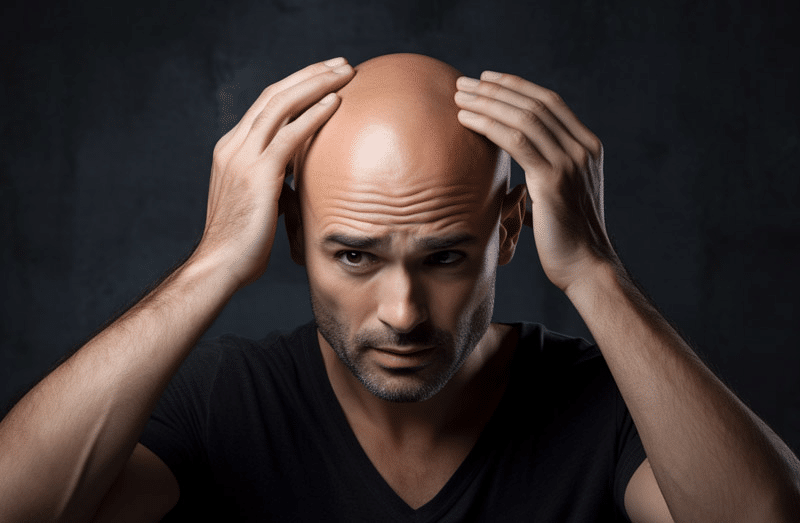The exploration of exosomes for hair loss treatment has emerged as a promising avenue in regenerative medicine. Exosomes, tiny vesicles secreted by various cells, including mesenchymal stem cells, have garnered attention for their role in intercellular communication and tissue regeneration. This innovative approach aims to leverage the regenerative potential of exosomes to stimulate hair growth and combat hair loss effectively.
By targeting key components of the hair growth cycle and influencing the activity of hair follicles, exosomes offer a novel therapeutic strategy for individuals grappling with hair loss concerns. In this article, we delve into the mechanisms underlying exosome-mediated hair regeneration, explore the clinical applications of exosomes for hair loss treatment, and discuss the potential implications of this cutting-edge therapy in revitalizing hair health.
Exosomes and Their Role in Regenerative Medicine

The potential of exosomes as a novel therapeutic approach for hair loss treatment stems from their ability to modulate cellular functions and promote tissue regeneration. Exosomes contain a rich cargo of bioactive molecules, including growth factors, cytokines, and microRNAs, which can influence the behavior of recipient cells.
In the context of hair loss, exosomes derived from mesenchymal stem cells have shown promise in stimulating hair follicle growth, prolonging the anagen (growth) phase of the hair growth cycle, and suppressing apoptotic pathways that contribute to hair follicle miniaturization.
Additionally, exosomes possess immunomodulatory properties that may mitigate inflammation and autoimmune reactions associated with certain types of hair loss, such as alopecia areata. Their small size and ability to penetrate tissues make exosomes an attractive candidate for topical application or injection directly into the scalp, offering a targeted and minimally invasive approach to hair regeneration.
EXOHAIR Procedure Exosomes are extracted from human mesenchymal stem cells and thoroughly tested for quality and quantity. Characterization of exosomes derived from human cells by nanoparticle tracking analysis and scanning electron microscopy. While both exosome therapy and stem cell therapy belong to regenerative medicine, they differ in their mechanisms of action and therapeutic applications.
Potential Therapeutic Applications of Exosomes

Exosomes, with their diverse cargo of bioactive molecules, hold significant potential for various therapeutic applications across a wide range of medical conditions. Some potential therapeutic applications of exosomes include:
Regenerative Medicine: Exosomes have regenerative properties and can promote tissue repair and regeneration. They hold promise for treating conditions such as wound healing, tissue injuries, and degenerative diseases by stimulating cell proliferation, angiogenesis, and extracellular matrix remodeling.
Cancer Therapy: Exosomes have emerged as key players in cancer progression and metastasis. However, they also offer potential as therapeutic agents for cancer treatment. Exosomes can be engineered to deliver anti-cancer drugs, RNA interference molecules, or immunomodulatory agents directly to tumor cells, offering a targeted and less toxic approach to cancer therapy.
Neurological Disorders: Exosomes can cross the blood-brain barrier and deliver therapeutic cargo to the central nervous system. They hold promise for treating neurodegenerative disorders such as Alzheimer’s disease, Parkinson’s disease, and stroke by promoting neuronal survival, regeneration, and synaptic plasticity.
Cardiovascular Diseases: Exosomes derived from stem cells or cardiac progenitor cells have shown potential for treating cardiovascular diseases such as myocardial infarction and heart failure. They can promote angiogenesis, improve cardiac function, and reduce inflammation in damaged cardiac tissues.
Immune Modulation: Exosomes have immunomodulatory properties and can regulate immune responses in various disease states. They hold promise for treating autoimmune disorders, inflammatory diseases, and transplant rejection by modulating immune cell activity and promoting immune tolerance.
Drug Delivery: Exosomes can serve as natural nanocarriers for drug delivery, offering several advantages such as biocompatibility, low immunogenicity, and the ability to target specific cell types. They hold promise for delivering therapeutic drugs, nucleic acids, or imaging agents to target tissues with enhanced precision and efficacy.
Aging and Tissue Repair: Exosomes have been implicated in the aging process and tissue repair mechanisms. They hold the potential for rejuvenating aged tissues, promoting wound healing, and delaying the onset of age-related degenerative diseases through their regenerative and anti-inflammatory properties.
Role of Exosomes in Tissue Regeneration and Repair

Exosomes and stem cell therapy play a crucial role in tissue regeneration and repair by facilitating intercellular communication and delivering bioactive molecules to target cells. These small extracellular vesicles are secreted by a variety of cell types, including stem cells, and contain a cargo of proteins, lipids, nucleic acids, and growth factors. Through their unique composition, exosomes can modulate cellular functions, promote cell proliferation, and stimulate tissue regeneration processes.
One of the primary mechanisms by which exosomes contribute to tissue regeneration and repair is through their ability to transfer functional molecules to recipient cells. Exosomes can deliver growth factors, cytokines, microRNAs, and other signaling molecules to target cells, influencing their behavior and function.
For example, exosome-mediated transfer of growth factors such as vascular endothelial growth factor (VEGF) and fibroblast growth factor (FGF) can promote angiogenesis and enhance blood vessel formation in damaged tissues, facilitating tissue repair.
Overall, the role of exosomes in tissue regeneration and repair is multifaceted and encompasses various mechanisms, including molecular signaling, immunomodulation, and cellular remodeling. Harnessing the regenerative potential of exosomes holds promise for developing innovative therapies to promote tissue repair and regeneration in a wide range of medical conditions, including wound healing, tissue injuries, and degenerative diseases.
Specific Mechanisms by Which Exosomes Promote Hair Growth

Exosomes promote hair growth through several specific mechanisms that target key components of the hair follicle and the hair growth cycle. Some of the mechanisms by which exosomes stimulate hair growth include:
Stem Cell Activation
Exosomes derived from mesenchymal stem cells (MSCs) contain growth factors and signaling molecules that can activate hair follicle stem cells, stimulating their proliferation and differentiation. This activation of stem cells promotes the regeneration of hair follicles and the growth of new hair strands.
Angiogenesis Promotion
Exosomes contain angiogenic factors such as vascular endothelial growth factor (VEGF) and fibroblast growth factor (FGF), which stimulate the formation of new blood vessels. Enhanced blood supply to the hair follicles improves nutrient and oxygen delivery, creating a favorable microenvironment for hair growth.
Anti-apoptotic Effects
Exosomes can inhibit apoptosis (cell death) of hair follicle cells by delivering anti-apoptotic factors and microRNAs to target cells. This anti-apoptotic activity protects hair follicles from damage and prolongs the anagen (growth) phase of the hair growth cycle, leading to increased hair growth and density.
Stimulation of Dermal Papilla Cells
Exosomes stimulate dermal papilla cells, which play a crucial role in hair follicle development and hair growth regulation. By delivering growth factors and signaling molecules, exosomes promote the proliferation and activity of dermal papilla cells, facilitating hair follicle growth and maintenance.
Regulation of Hair Follicle Cycling
Exosomes can modulate the activity of signaling pathways involved in the hair growth cycle, such as the Wnt/β-catenin pathway. By regulating the expression of key genes and proteins involved in hair follicle cycling, exosomes promote the transition of hair follicles from the resting (telogen) phase to the growth (anagen) phase, stimulating hair growth.
Reduction of Inflammation
Exosomes possess anti-inflammatory properties and can modulate immune responses in the scalp. By suppressing inflammation and immune reactions that contribute to hair follicle miniaturization and hair loss, exosomes create a conducive environment for hair growth and regeneration.
Overall, the specific mechanisms by which exosomes promote hair growth involve a combination of factors, including stem cell activation, angiogenesis promotion, anti-apoptotic effects, stimulation of dermal papilla cells, regulation of hair follicle cycling, and reduction of inflammation. By targeting these mechanisms, exosome-based therapies offer a promising approach to stimulate hair growth and combat hair loss effectively.
Scientific Evidence Supporting the Use of Exosomes for Hair Loss Treatment

The use of exosomes for hair loss treatment is supported by a growing body of scientific evidence from preclinical studies, animal models, and clinical trials. Several key studies have demonstrated the efficacy of exosome-based therapies in promoting hair growth and reversing hair loss. Here are some examples of scientific evidence supporting the use of exosomes for hair loss treatment:
Preclinical Studies
In vitro studies using human dermal papilla cells have shown that exosomes derived from mesenchymal stem cells (MSCs) can stimulate hair follicle growth and increase the expression of hair growth-related genes, such as vascular endothelial growth factor (VEGF) and insulin-like growth factor 1 (IGF-1). These findings suggest that exosomes have potent hair growth-promoting effects at the cellular level.
Animal Models
Animal studies using rodent models of hair loss, such as mice and rats, have provided further evidence of the efficacy of exosome-based therapies for hair regeneration. In one study, intradermal injection of exosomes derived from adipose-derived stem cells (ADSCs) promoted hair regrowth and increased hair follicle density in a mouse model of chemotherapy-induced alopecia.
Similar results have been observed in other animal models of hair loss, highlighting the therapeutic potential of exosomes for hair regeneration.
Clinical Trials
Several clinical trials have investigated the safety and efficacy of exosome-based therapies for hair loss treatment in human subjects. While the number of clinical trials is relatively limited compared to preclinical studies, preliminary findings have shown promising results.
For example, a pilot study involving patients with androgenetic alopecia (male pattern baldness) demonstrated that topical application of exosome-derived growth factors led to significant improvements in hair density and thickness after 12 weeks of treatment.
Mechanistic Studies
Mechanistic studies have provided insights into the underlying mechanisms of action of exosomes in hair regeneration. Exosomes have been shown to promote angiogenesis, stimulate dermal papilla cell proliferation, and modulate hair follicle cycling, leading to enhanced hair growth and regeneration.
Additionally, exosomes possess anti-inflammatory properties that may mitigate inflammation and immune reactions associated with certain types of hair loss.
Types of Exosomes Used in Hair Regrowth Therapies

Exosomes used in hair regrowth therapies can be categorized into two main types: natural exosomes and engineered exosomes. Here’s an overview of each type:
Natural Exosomes
Natural exosomes are derived from biological sources, such as mesenchymal stem cell-derived stem cells (ADSCs), or other cell types with regenerative properties. These exosomes are isolated from the conditioned media of cultured cells and contain a cargo of bioactive molecules, including growth factors, cytokines, and microRNAs, that promote hair growth and regeneration.
Regenerative medicine and natural exosomes are often used in their native form for hair regrowth therapies and are known for their regenerative and immunomodulatory properties.
Engineered Exosomes
Engineered exosomes are exosomes that have been modified or loaded with specific therapeutic payloads to enhance their efficacy for hair regrowth. This may involve genetic engineering techniques to overexpress specific growth factors or microRNAs within the exosomes, or loading exosomes with exogenous molecules such as drugs or nucleic acids.
Engineered exosomes offer the advantage of targeted delivery and controlled release of therapeutic agents, allowing for precise modulation of hair growth pathways and improved treatment outcomes.
Natural Sources of Exosomes

Natural sources of exosomes include various cell types that secrete these extracellular vesicles as part of their normal physiological functions. Some common natural sources of exosomes used in hair regrowth therapies include:
Mesenchymal Stem Cells (MSCs)
MSCs are multipotent stem cells found in various tissues, including bone marrow, adipose tissue, and umbilical cord tissue. MSC-derived exosomes are rich in growth factors, cytokines, and extracellular matrix proteins that promote tissue regeneration and repair. MSC-derived exosomes have shown promise in promoting hair growth and stimulating hair follicle regeneration in preclinical studies and clinical trials.
Adipose-Derived Stem Cells (ADSCs)
ADSCs are stem cells found in adipose tissue (fat) that can differentiate into various cell types, including adipocytes, chondrocytes, and osteocytes. ADSC-derived exosomes contain a cargo of bioactive molecules that stimulate angiogenesis, inhibit apoptosis, and modulate immune responses.
ADSC-derived exosomes have been investigated for their potential to promote hair growth and treat hair loss conditions such as androgenetic alopecia.
Dermal Papilla Cells
Dermal papilla cells are specialized cells located at the base of hair follicles that play a crucial role in hair follicle development and hair growth regulation. These Dermal papilla cells secrete exosomes that contain growth factors, extracellular matrix proteins, and signaling molecules involved in hair follicle morphogenesis and cycling.
According to studies, Dermal papilla cell-derived exosomes have shown promise in promoting hair growth and revitalizing dormant hair follicles in preclinical studies.
Platelets
Platelets, also known as thrombocytes, are blood cells involved in the clotting process and wound healing. Platelet-derived exosomes, also known as platelet-rich exosomes, are enriched in growth factors such as platelet-derived growth factor (PDGF), transforming growth factor-beta (TGF-β), and vascular endothelial growth factor (VEGF).
Platelet-derived exosomes have been investigated for their potential to promote tissue regeneration and wound healing, including hair follicle regeneration in hair loss conditions.
Engineered Exosomes for Hair Regeneration

Engineered exosomes for hair regeneration involve the modification or manipulation of exosomes to enhance their therapeutic efficacy in promoting hair growth and reversing hair loss. These engineered exosomes may be tailored to deliver specific bioactive molecules, such as growth factors or microRNAs, to target cells and tissues in the scalp. Here are some approaches to engineering exosomes for hair regeneration:
Genetic Modification
Exosomes can be genetically modified to overexpress specific growth factors or microRNAs that promote hair growth and inhibit hair loss. For example, exosomes may be engineered to express high levels of vascular endothelial growth factor (VEGF), fibroblast growth factor (FGF), insulin-like growth factor-1 (IGF-1), or microRNAs known to regulate hair follicle cycling and proliferation.
Loading with Therapeutic Payloads
Exosomes can be loaded with exogenous molecules, such as drugs, nucleic acids, or proteins, to enhance their therapeutic potential for hair regeneration. This may involve encapsulating growth factors, small molecules, or nucleic acids within the exosome cargo or attaching them to the surface of exosomes using various conjugation techniques.
Surface Modification
Exosome surface proteins can be modified to enhance their targeting ability and improve their interaction with target cells in the scalp. This may involve engineering exosomes to express specific cell-surface receptors or ligands that facilitate their binding and uptake by hair follicle cells, thereby enhancing their regenerative effects.
Encapsulation in Nanoparticles
Exosomes can be encapsulated within biocompatible nanoparticles to improve their stability, bioavailability, and controlled release properties. Nanoparticle-based delivery systems can protect exosomes from degradation, prolong their circulation time in the body, and facilitate their targeted delivery to hair follicles in the scalp.
Functionalization with Targeting Ligands
Exosomes can be functionalized with targeting ligands or antibodies that recognize specific cell surface markers on hair follicle cells. This enables exosomes to selectively bind to and deliver their cargo to hair follicle stem cells, dermal papilla cells, or other cell types involved in hair regeneration, enhancing their therapeutic efficacy.
Patient Experiences and Outcomes with Exosome Treatments

Patient experiences and outcomes with exosome treatments for hair regeneration have shown promising results in clinical settings. While research in this area is still ongoing, anecdotal reports and preliminary data from clinical trials suggest positive responses among patients receiving exosome therapy for hair loss. Here are some common patient experiences and outcomes observed with exosome treatments:
Improved Hair Density
Some patients report an increase in hair density and thickness following exosome treatments. This may manifest as the appearance of new hair growth, improvement in hair coverage, and reduction in visible scalp areas.
Stimulation of Dormant Hair Follicles
Patients with dormant or miniaturized hair follicles may experience stimulation of follicular activity and the emergence of new hair growth after exosome therapy. This can lead to the revitalization of dormant follicles and the restoration of hair growth in previously bald or thinning areas.
Enhanced Hair Quality
Patients often report improvements in hair quality, including increased strength, resilience, and shine, after undergoing exosome treatments. Exosomes may help to nourish and fortify hair follicles, resulting in healthier-looking hair with reduced breakage and brittleness.
Slowed Progression of Hair Loss
Exosome treatments may help to slow down the progression of hair loss and prevent further hair thinning in some patients. By promoting hair follicle survival, inhibiting apoptosis, and stimulating hair growth pathways, exosomes may contribute to maintaining existing hair and delaying the onset of balding.
Minimal Downtime and Side Effects
Patients generally report minimal downtime and few adverse effects associated with exosome treatments. Since exosomes are derived from natural sources and administered topically or via injection, they are well-tolerated by most individuals and typically do not cause significant discomfort or adverse reactions.
Long-Term Benefits
While individual responses to exosome therapy may vary, some patients report sustained benefits and long-term improvements in hair growth and quality after undergoing multiple treatment sessions over time. Long-term follow-up studies are needed to assess the durability and longevity of the effects of exosome treatments for hair regeneration.
Factors Influencing Cost of Exosome Therapies

The cost of exosome therapies for hair regeneration varies based on factors such as treatment protocol, exosome source, treatment facility, provider expertise, additional services, product quality, patient-specific factors, and insurance coverage.
Treatment protocols, including the number of sessions and dosage, influence costs, as do the location and reputation of the treatment facility. Providers with specialized expertise may charge more, and additional services or complementary treatments can increase costs.
The quality and purity of exosome products also impact pricing. Insurance coverage varies, and patient-specific factors, like the extent of hair loss, can affect overall costs.
Will Exosomes for Hair Loss Work for You?

In conclusion, exosome therapy holds promising potential as a novel and effective treatment for hair loss. With their ability to deliver growth factors, cytokines, and microRNAs to hair follicle cells, exosomes stimulate proliferation, angiogenesis, and tissue regeneration in the scalp, promoting hair growth and revitalization.
While further research and clinical trials are needed to fully understand the long-term efficacy and safety of exosome therapy for hair loss, early results and patient experiences are encouraging. As advancements continue in the field of regenerative medicine, exosome treatments may offer new hope for individuals seeking non-invasive and natural solutions to hair loss conditions.
When it comes to the therapeutic potential of stem cell therapy, patients need to consult with qualified healthcare providers like those at Stem Cells LA to explore exosome therapy as a potential option tailored to their specific needs and preferences.


